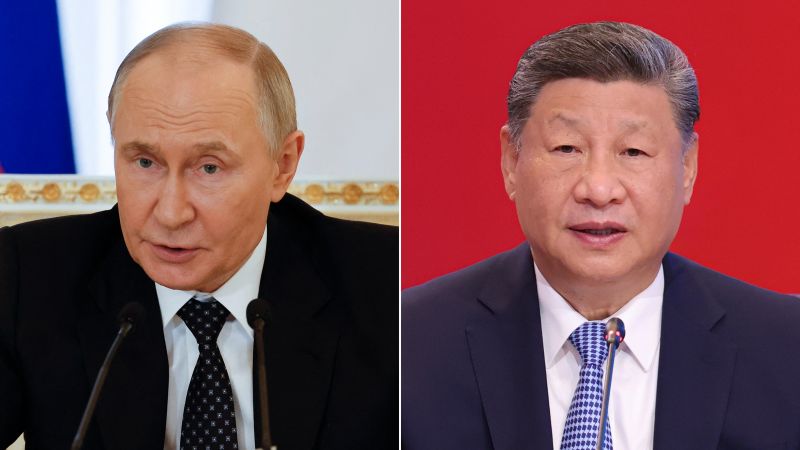 |
|
The article examines the geopolitical dynamics surrounding the escalating tensions between Israel and Iran, particularly focusing on the roles that China and Russia are attempting to play in the conflict. It highlights how both nations are positioning themselves as voices of reason and restraint, contrasting their approach with what they perceive as a more aggressive stance from the United States, especially under the leadership of President Donald Trump. The analysis delves into the motivations behind China and Russia's involvement, their specific actions and statements, and the potential implications for the broader Middle East region and the global balance of power. At the core of the analysis is the assertion that the intensifying conflict between Israel and Iran presents Beijing and Moscow with a strategic opportunity to portray themselves as viable alternatives to US influence and leadership on the global stage. This narrative is constructed through diplomatic pronouncements, such as the phone call between Xi Jinping and Vladimir Putin, where they reportedly condemned Israel’s actions as a violation of international law and called for de-escalation. However, the article also acknowledges the inherent complexities and contradictions in their positions, particularly Russia’s own violations of international law in Ukraine, which China has conspicuously avoided condemning. Xi Jinping's call for warring parties, especially Israel, to cease fire, represents a nuanced difference from his foreign minister's explicit condemnation of Israel. This suggests a calculated approach by China, aimed at maintaining a degree of neutrality while still signaling disapproval of actions that could further destabilize the region. Xi's veiled message to Trump, emphasizing the responsibility of major powers to de-escalate tensions, is interpreted as a direct critique of US policy in the Middle East, which Beijing views as a source of instability. The article cites Chinese scholars who attribute the latest flare-up to the uncertainty created by Trump's second presidency and the chaotic nature of his Middle East policy, further reinforcing this view. These scholars argue that Trump has undermined the authority and credibility of US policy in the region, weakened its leadership among allies, and eroded its ability to deter adversaries.
The potential for the US to be drawn into another “forever war” in the Middle East is a significant concern for China, as it could divert Washington’s attention and resources away from its strategic competition with Beijing in the Indo-Pacific region. The article underscores China's interest in preventing an all-out war against Iran, as it views the current Iranian regime as a crucial counterweight to US dominance in the Middle East. China has cultivated close ties with Iran through sustained oil imports, strategic partnerships within organizations like the Shanghai Cooperation Organization and BRICS, and its Belt and Road Initiative, where Iran serves as a critical node. The country’s location near the Gwadar port in Pakistan and the Strait of Hormuz further solidifies its importance to China’s economic and strategic interests. These factors combined make it unfavorable for China to see Iran destabilized through war with the United States. The article also explores China’s efforts to position itself as a mediator in the Israel-Iran conflict, highlighting Xi’s proposals for de-escalation and Wang Yi’s diplomatic outreach to various regional actors. However, it acknowledges the limitations of China’s ability to effectively mediate such a complex and protracted conflict, given its lack of experience and political or security presence in the region. The article further contrasts China's efforts in the Middle East with its approach to the war in Ukraine, where it has provided diplomatic cover and economic support to Russia, despite casting itself as a neutral peace broker. This raises questions about the credibility and effectiveness of China’s mediation efforts, particularly in situations where it has vested interests or conflicting priorities. Despite these limitations, the article concludes that China’s mere presentation of itself as a voice of restraint in the Iran conflict could be considered a symbolic victory, especially in the eyes of the Global South, where America’s global leadership is increasingly under scrutiny. This symbolic gain could enhance China’s image as a responsible and reliable global power, further challenging the US-led world order.
The geopolitical chessboard is constantly evolving, and the Israel-Iran conflict is a prime example of how global powers are maneuvering to assert their influence. The current situation presents China with an unprecedented opportunity to showcase its diplomatic prowess and offer an alternative vision for conflict resolution in the Middle East. However, China's role is not without its complexities. Its close ties with Iran, driven by energy security and strategic considerations, make it difficult to be seen as an impartial mediator by all parties involved. Similarly, Russia's involvement is viewed with skepticism, given its own military actions in Ukraine and its complex relationship with both Iran and Israel. The United States, under President Trump, is portrayed as a destabilizing force in the region, with its policies often seen as unpredictable and transactional. This perception has created a vacuum for other global powers to step in and offer alternative solutions. The article also underscores the importance of economic factors in shaping geopolitical strategies. China's Belt and Road Initiative, with Iran as a key node, is a testament to the importance of infrastructure and investment in fostering regional stability and economic growth. The potential for another “forever war” in the Middle East is a significant concern for China, as it could divert resources and attention away from its own economic and strategic priorities. Ultimately, the article suggests that the Israel-Iran conflict is not just a regional dispute, but a reflection of the broader global power struggle. China and Russia are seizing the opportunity to challenge US dominance and present themselves as responsible and reliable actors on the world stage. The effectiveness of their efforts remains to be seen, but their involvement is undoubtedly reshaping the geopolitical landscape of the Middle East.
Source: Xi and Putin present united front over Israel-Iran crisis, in veiled message to Trump
